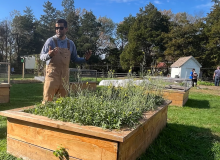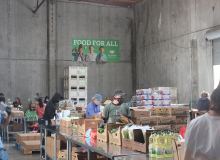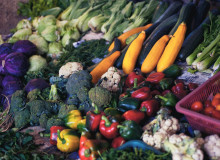food insecurity
George Washington University
In this photo essay, learn how one non-profit focused on sustainable agriculture is addressing the issue of food deserts in Washington D.C.
George Washington University
This podcast introduces the idea of food representation, an addition to the Farm Bill that will turn food swamps and deserts into lush rainforest with diverse variety of accessible, nutritional foods.
Planet Forward FAO Fellow | George Washington University
The city of San Francisco and local organizations innovated to serve food insecure populations during the pandemic. Can food initiatives have the infrastructure to be durable?
George Washington University
In this short film, Planet Forward Comcast Sustainable Storytelling Fellow Francesca Edralin explores how classroom gardening can be used as a tool to address food insecurity.
George Washington University
After spending this semester working on a documentary, I have a lot to share about what I learned.
Ithaca College
Local farms provide communities not only with nutritious food, but also a way towards environmental sustainability by working directly with their local community.
Planet Forward Correspondent | Dartmouth College
The Green Corn Project empowers Austinites in urban food deserts by building gardens in their own front yards.
George Washington University
Alicia Powers, the managing director of the Hunger Solutions Institute at Auburn University, shares how groups are addressing the effects of the COVID-19 pandemic on food insecurity, and how sustainability can be prioritized too.
University of Wisconsin-Madison
Organizations in Madison, Wisconsin, focus on community-based solutions to improving food access during the COVID-19 pandemic and beyond.
SUNY Plattsburgh
This creative project helps alleviate food insecurity in a remote area of New York. Plus, eight more ideas on how you can get involved in eliminating food deserts where you live.







